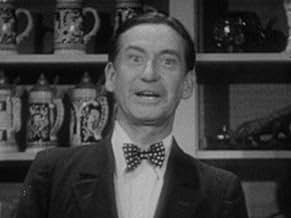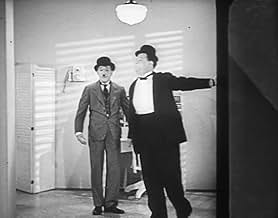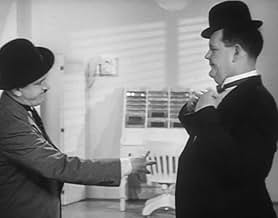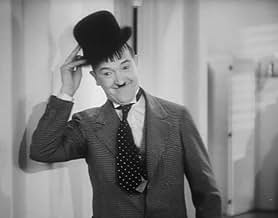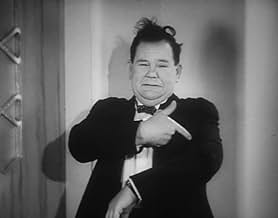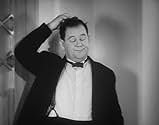Aggiungi una trama nella tua linguaAfter an endless cycle of dish washing, Ollie makes a withdrawal, ending up in the hospital after buying a grandfather clock. Only a generous blood transfusion can help him bounce back; howe... Leggi tuttoAfter an endless cycle of dish washing, Ollie makes a withdrawal, ending up in the hospital after buying a grandfather clock. Only a generous blood transfusion can help him bounce back; however, is modern medicine prepared for the outcome?After an endless cycle of dish washing, Ollie makes a withdrawal, ending up in the hospital after buying a grandfather clock. Only a generous blood transfusion can help him bounce back; however, is modern medicine prepared for the outcome?
- Regia
- Sceneggiatura
- Star
- Auctioneer
- (non citato nei titoli originali)
- Bank Teller
- (non citato nei titoli originali)
- Dr. F.D. Allen
- (non citato nei titoli originali)
- Hospital Visitor
- (non citato nei titoli originali)
- Man at Auction
- (non citato nei titoli originali)
- Nurse
- (non citato nei titoli originali)
- Auction Bidder
- (non citato nei titoli originali)
- Nurse Goodall
- (non citato nei titoli originali)
- Bank Teller
- (non citato nei titoli originali)
Recensioni in evidenza
The film kicks off with an amusing washing up routine, Ollie cleaning the plates, with Stan drying them and then passing them back to Ollie to wash again. When Ollie sees what Stan has been doing he tells him to put the plates elsewhere, so Stan stacks them on a lit gas burner; Ollie picks them up to put them in the cupboard, burns his hands and drops all of the crockery. So far, so chucklesome.
A little later, Laurel and Hardy regular co-star James Finlayson arrives at the house to collect payment for the Hardy's furniture, which leads to a clever verbal exchange between all of the characters akin to Abbott and Costello's famous 'Who's on first?' routine. Following this, Stan tells Ollie that he should pay for the furniture outright with his savings, but Mrs. Hardy disagrees. Egged on by Stan, Ollie goes to the bank to withdraw the cash, but instead of paying for the furniture, he mistakenly spends the money on a grandfather clock in an auction (the price going sky high thanks to Stan). On their way home with their purchase, the clock is smashed to pieces by a lorry.
When Mrs. Hardy discovers what has happened, she loses her cool and hits her husband over the head with a frying pan (climbing on a chair to do so). In hospital, Ollie requires a blood transfusion, with Stan as the donor, and the results are unexpectedly bizarre.
Not only does this short deliver solid laughs at regular intervals, but it also features some wonderful transitions, Stan pulling the next scene from the side and dragging it across the screen. It's clever stuff for the time and really adds to the fun.
One Good Turn (1931) ** 1/2 (out of 4) L&H set out to raise $100 when they overhear an elderly woman say she's going to be evicted. Not too many laughs in this one outside the opening sequence in the woods.
Leave 'Em Laughing (1928) ** 1/2 (out of 4) Laurel is suffering from a toothache so Hardy takes him to the dentist who accidentally fills them with laughing gas. The early gags of Hardy trying to pull the tooth are funny but the ending with the cars goes on a bit too long and gets rather tiresome.
They Go Boom! (1929) *** (out of 4) Hardy has a cold so it's up to Laurel to try and find a cure so that they can get a good night's sleep. Highlights include the mustard bath and the exploding mattress.
Although the film feels like it has been made up of several good ideas rather than one, it still manages to be very funny for the most part. The opening dish washing routine is a great example of how much comedy they can get from a simple concept, while the `I gave it to him to give to you' routine is a good example of their verbal skills as actors. The short continues well but isn't able to be as good as it's first half again. The final scene is funny but the whole hospital epilogue doesn't really belong and it suggests that the idea occurred to them and they just looked for a film that they could tack it onto.
This sounds like a problem but it isn't that big a deal as the majority of the film works really well. Hardy and Laurel work well together and do well with the many types of routine they have here just the routine where Laurel keeps putting clean dishes into the sink for washing is a good example of how their looks and body language can create laughs. Pollard is a good Mrs Hardy as she is feisty without being too dour. Finlayson enjoys his role as he has more dialogue than usual but also gets to do his `d'oh' and double take stuff (often it seems he either gets the physical stuff OR the dialogue).
Overall this is a really funny little short from Laurel and Hardy. The ending may feel like it doesn't belong with this film but even it manages to be worth a laugh! The fancy way that the scenes are linked (sliding doors effects) adds a novelty feel to what is a strong short from Laurel and Hardy.
Personally I felt that the banter about who gave the money to whom went on a bit longer than it needed to. I hope audiences in 1935 found it more engaging than I did.
The main reason I wanted to write a review is that I was impressed by the creative and clever way they handled scene changes from the Hardy house to other locations. Stanley grabs what might be some sort of pocket door or panel (if it were a real house) and pulls on its thick black border to walk it across the screen. The scene changes with it. In one of these clever "wipes" he accidentally lets go and it returns to the right side of the screen. So he grabs it again and walks it across the room. The scene change follows the movement of this panel. I haven't seen this trick done before. And being that this was decades before green screen, it must have been rather labor intensive to handle it in the cutting room. Bravo for this quirky little technique!
Lo sapevi?
- QuizThis is Laurel & Hardy's last two-reel short, except for a cameo appearance in On the Wrong Trek (1936). Hal Roach decided to move the pair into feature-length films from here on.
- BlooperWhen the truck runs over the grandfather clock, there are no mechanical parts inside.
- Citazioni
Mrs. Daphne Hardy: Oliver, did I or did I not give you the money to pay on the furniture?
Ollie: You certainly did.
Mrs. Daphne Hardy: Then why wasn't it paid?
Ollie: [points to Stan] Why I gave it to him to pay it for me.
Mrs. Daphne Hardy: [to Stan] Then what did YOU do with it?
Stanley: [points to Ollie] I gave it back to him.
Ollie: You gave it to ME?
Stanley: Yeah, I gave it to you to pay my room and board, and you gave it to her.
[points to Mrs. Hardy]
Stanley: "Recomember"?
Mrs. Daphne Hardy: Do you mean to say that the money that he
[points to Ollie]
Mrs. Daphne Hardy: gave to you
[points to Stan]
Mrs. Daphne Hardy: that you gave to him
[points to Ollie]
Mrs. Daphne Hardy: that he gave to me was the same money that I gave to him
[points to Ollie]
Mrs. Daphne Hardy: to pay HIM?
[points to Finlayson]
Stanley: Well if that was the money that you gave to him
[points to Ollie]
Stanley: to give to me
[points to self]
Stanley: to pay to him
[points to Finlayson]
Stanley: It must have been the money I gave him
[points to Ollie]
Stanley: to give to you to pay my rent, didn't I?
[Ollie nods wildly]
- Versioni alternativeThere is also a colorized version.
- ConnessioniFeatured in Omnibus: Cuckoo: A Celebration of Mr. Laurel and Mr. Hardy (1974)
I più visti
Dettagli
- Data di uscita
- Paese di origine
- Sito ufficiale
- Lingua
- Celebre anche come
- Thicker Than Water
- Luoghi delle riprese
- Azienda produttrice
- Vedi altri crediti dell’azienda su IMDbPro
- Tempo di esecuzione
- 21min
- Colore
- Proporzioni
- 1.33 : 1

